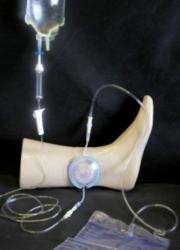Washing away painful wounds

More than six million people in the U.S. suffer from persistent wounds -- open sores that never seem to heal or, once apparently healed, return with a vengeance. The bedridden elderly and infirm are prone to painful and dangerous pressure ulcers, and diabetics are susceptible to wounds caused by a lack of blood flow to the extremities.
"The problem is chronic," says Prof. Amihay Freeman of Tel Aviv University's Department of Molecular Microbiology and Biotechnology. To solve it, he's developed a unique device that uses a solution to whisk away dead tissue, bathing the wound while keeping dangerous bacteria away.
Prof. Freeman's "Dermastream" provides an enzyme-based solution that flows continuously over the wound, offering an alternative treatment to combat a problem for which current treatments are costly and labor-intensive. It could save the American healthcare system millions of dollars a year, and could be in hospitals and doctor's offices soon: Dermastream has passed clinical trials in Israeli hospitals and may be available in the U.S. within the next year, says Prof. Freeman.
Smarter and less painful wound care
Employing a special solution developed at Prof. Freeman's Tel Aviv University laboratory, Dermastream offers a new approach to chronic wound care, a specialty known as "continuous streaming therapy."
"Our basic idea is simple," says Prof. Freeman. "We treat the wound by streaming a solution in a continuous manner. Traditional methods require wound scraping to remove necrotic tissue. That is expensive, painful and extremely uncomfortable to the patient. And while active ingredients applied with bandages on a wound may work for a couple of hours, after that the wound fights back. The bacteria build up again, creating a tedious and long battle."
Dermastream "flows" under a plastic cover that seals the wound, providing negative pressure that promotes faster healing. The active biological ingredient, delivered in a hypertonic medium, works to heal hard-to-shake chronic wounds. While traditional bandaging methods may take months to become fully effective, Dermastream can heal chronic wounds in weeks, Prof. Freeman says.
Liquid armor to fight bacteria
Dermastream is intended for use in hospitals, nursing homes, outpatient clinics and homecare. Prof. Freeman has founded a company that is currently collaborating with a Veterans Association hospital in Tucson, AZ, to bring the technology to the U.S. market.
Dermastream was an outgrowth of Prof. Freeman's original laboratory research, which investigated the use of enzymes for pharmaceutical applications. Enzymes were previously applied to wounds as ointments, but were slow-acting and required a great deal of time to apply. Coupling the enzymes with a continuous stream of liquid, he unlocked the power of the enzymes in a way that works and makes sense, he says.
"My solution helps doctors regain control of the chronic wound, making management more efficient, and vastly improving the quality of their patients' lives," Prof. Freeman concludes.
Source: Tel Aviv University (news : web)















